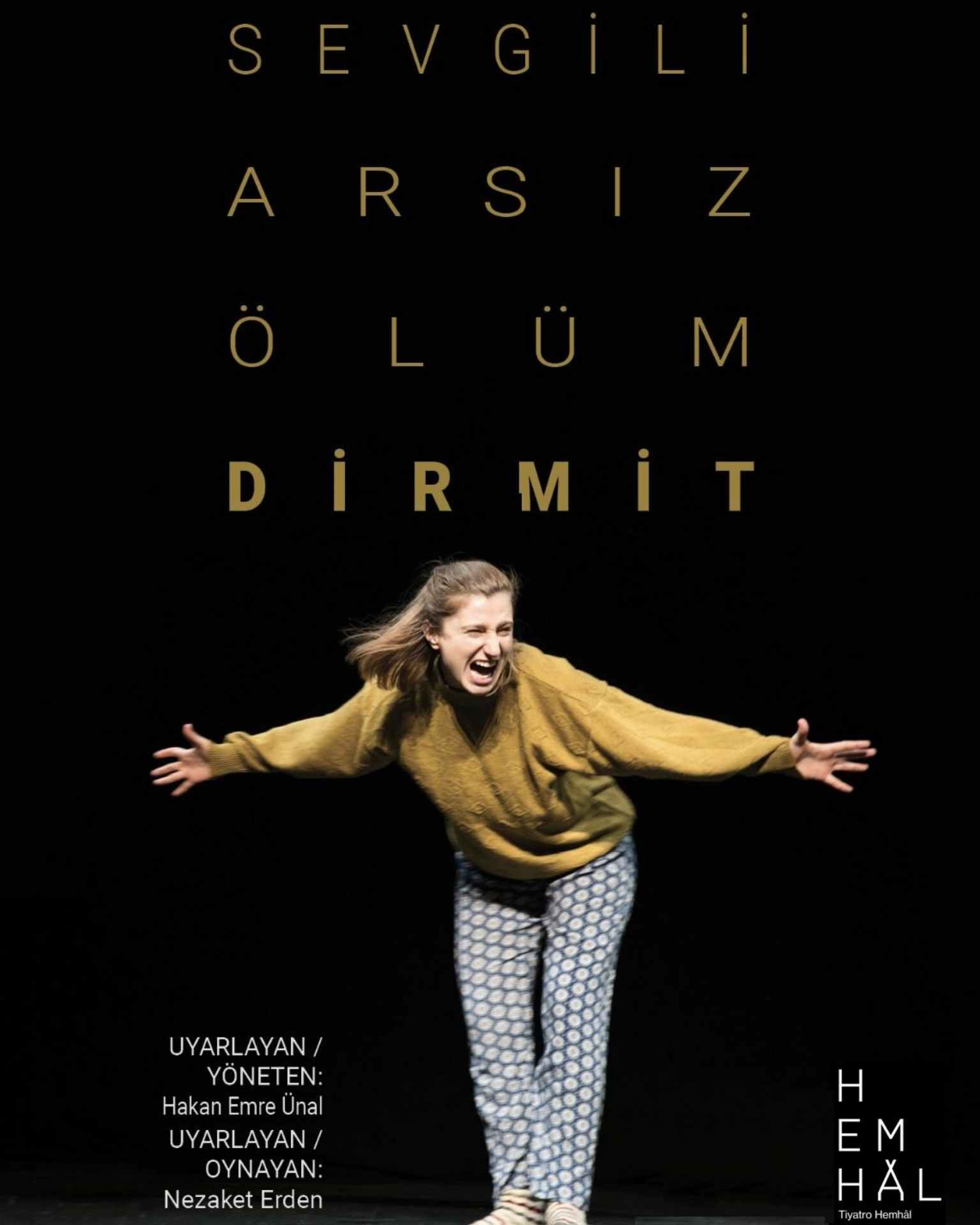Dirmit is the theatre adaptation of Latife Tekin’s novel Dear Arsız Ölüm.
Before talking about the play Dirmit, I would like to talk about Nezaket Erden. Nezaket was born in Mersin on 16 July 1990. She spends her childhood in the village in a family that is so protective that it cannot be called conservative. She went to the mosque every summer, just like every child in the 90s did in the summer. Nezaket, who is at the mosque during the day, has to be at home in the evenings. After the evening prayer, girls cannot play on the street. The enthusiasm and the lack of enthusiasm she has to live with makes her a withdrawn child. She plays a lot at weddings with her family and dancing suddenly becomes her passion. While he sees dance as a means of expressing his feelings and derives great pleasure from it, she loses his enthusiasm during his secondary school years. This situation leads her to volleyball.
Nezaket loves volleyball very much. She experiences her enthusiasm to the peaks. As the matches and tournaments started and her success at school declined, her mother put a stop to volleyball. Nezaket has to move away from volleyball in this way.
While thinking that it’s okay, there will always be another way to express this mercy, she gets the enthusiasm to become a radio broadcaster. Although she likes the countless radio programmes she listens to and the recordings she makes by herself, the fact that she does this job only with her voice and that she is not visible causes her love of radio to end.
Nezaket wants to be seen, heard and seen. While searching for a course in line with her goal, she sees the course announcement of the municipality and starts the course with excitement. That’s it! But unfortunately she is unhappy. Although she wants to be seen, watched and heard, Nezaket is a shy and timid young girl. Even though she loves the stage, the people on the stage and the people she works with make her even more pessimistic. Nezaket is so sure that the stage is the only place where she can make her point that she decides to leave Mersin and continue on this path without giving up. She had to go to Istanbul for university. At that time, she came across an interview with Haluk Bilginer, and she started to think that studying philosophy or sociology would be very useful for aspiring actors.
She had to go from Mersin to Istanbul to study philosophy, but she had to study in such a school that the school’s theatre clubs were qualified.
She moved to Istanbul to study Philosophy at Galatasaray University, but living here was very difficult for her financially and morally. She should not have given up, she could keep up with the city thanks to the friends she knew in the theatre clubs. After graduating from the Philosophy department, she was going to adapt Latife Tekin’s “Sevgili Arsız Ölüm” to the stage as her graduation thesis while she was doing her master’s degree in acting in the Film and Drama department at Kadir Has University. This book was very valuable to her, just when she was giving up, she was looking for a reason to continue. Dirmit gave Nezaket and Nezaket gave Dirmit the strength to resist.
She contacted Latife Tekin, obtained the necessary permissions and Dirmit, the character of the novel, was now in front of the audience in flesh and blood.
Nezaket’s childhood dream had come true and now everyone could see her.
***
Sevgili Arsız Ölüm-Dirmit tells us the story of a family migrating from the village to the city through one night of the character Dirmit. Such a narration, such an acting. While watching the play, you want to go to the stage and hug Dirmit tightly. In Dirmit’s dreams, coming to Istanbul from the village was so beautiful. Dirmit was going to do so much in her new life. But the city she came to was not the city of her dreams. What she encountered. Although her small body could not handle it, she always tried a new method. Ah Dirmit! The struggle to hold on to the city in the one-room house they were stuck in. Every member of the family is looking for a branch to hold on to. These paths are usually always disappointing. Dirmit, thanks to her inertia, curiosity, excitement and resistance, somehow overcomes every difficulty she encounters and tries another way.
She’s not your mother, she’s not your father, let it go!
Dirmit was proud of being the only literate person in the family. However, it was not easy to achieve this success. On the one hand, Dirmit was known for her stubbornness and determination; on the other hand, she had a spirit that did not want to limit her joy and intelligence. She defied every prohibition, and even her brothers and their father could not keep up with her determination. Their mother would always say, “He’s not your mother, he’s not your father, let it go,” but Dirmit would never give in.
When he was interested in the radio, he used to listen to it secretly, but of course he was caught in the end. When she was interested in playing volleyball, she was a ball. When she wanted to see her friend Aysun, she was forbidden to see her. When she started dancing, she was banned. When he showed interest in poetry, he was banned! Even walking on the street was banned.
Every time, her mother would say that Dirmit was getting carried away with the activities of the “association of goblins”. Each time, despite her mother’s words, “Is a young girl so busy?”, Dirmit continued to resist. And each time she would find a new interest for herself. Over time, she began to believe that the way to overcome her mother was to be interested in something without things. So, she started the black dot game by closing her eyes. By opening each black dot, he discovered new lives and worlds. But even this game was eventually banned.
Dirmit resisted the morals of her family who came from the village to the city. Dirmit showed us the resistance of many young girls. We cried in some places, and in some places we couldn’t hold back our laughter.
TITLE
Year of First Performance: 2018
Genre: Drama, Tragedy
Written by: Latife Tekin
Edited and Directed by: Hakan Emre Ünal
Edited and Performed by: Nezaket Erden
Project Consultant: Zeynep Günsur Yüceil
Reji Advisor: Celal Mordeniz




